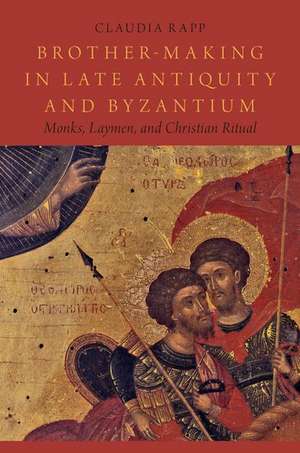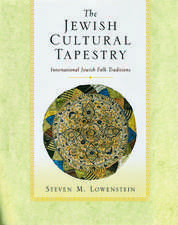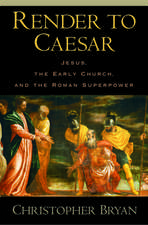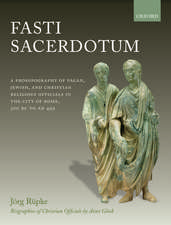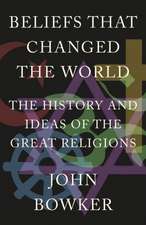Brother-Making in Late Antiquity and Byzantium: Monks, Laymen, and Christian Ritual: Onassis Series in Hellenic Culture
Autor Claudia Rappen Limba Engleză Hardback – 10 mar 2016
Preț: 531.48 lei
Preț vechi: 707.84 lei
-25% Nou
Puncte Express: 797
Preț estimativ în valută:
101.71€ • 105.54$ • 85.01£
101.71€ • 105.54$ • 85.01£
Carte tipărită la comandă
Livrare economică 04-10 martie
Preluare comenzi: 021 569.72.76
Specificații
ISBN-13: 9780195389333
ISBN-10: 0195389336
Pagini: 364
Ilustrații: 11 figures, 2 maps
Dimensiuni: 236 x 152 x 25 mm
Greutate: 0.7 kg
Editura: Oxford University Press
Colecția OUP USA
Seria Onassis Series in Hellenic Culture
Locul publicării:New York, United States
ISBN-10: 0195389336
Pagini: 364
Ilustrații: 11 figures, 2 maps
Dimensiuni: 236 x 152 x 25 mm
Greutate: 0.7 kg
Editura: Oxford University Press
Colecția OUP USA
Seria Onassis Series in Hellenic Culture
Locul publicării:New York, United States
Recenzii
This book is an erudite study on asceticism in Late Antiquity and Byzantium. Written by the eminent scholar Claudia Rapp ... it is a fascinating and welcome contribution to the field of early monasticism ... This is an excellent book, indispensable for scholars of asceticism in the later Roman world, and well worth the attention of a broader audience. Written by a brilliant scholar, Brother-Making in Late Antiquity and Byzantium is equally valuable for research and teaching.
Rapp has taken hold of a theme that binds early monasticism to later Byzantine secular life and forms a nexus of its religious, personal, and political history. Through an admirable command of sources that span a millennium, including narratives and little-studied prayer books, she presents Byzantium at its most unfamiliar and yet most intimate. The book is among a rare few that make Byzantium more intriguing and more accessible for anthropological study.
A masterly combination of historical anthropology and textual scholarship, which lifts the lid on social values in Byzantium. With clear and sympathetic insight, Professor Rapp shows how the cultural simulation of a biological kinship bond evolved from the consecration of spiritual togetherness to the strategic crossing of social boundaries for mutual support in a competitive world.
Rapp provides a compelling account of social relationships in Byzantium through the prism of brother-making. We are taken on a tour of such subjects as family relationships, the language of family as it applies to other relationships, and the development and variety of early monasticism, and not just in Byzantium but elsewhere in Europe and beyond ... One cannot help but be drawn into this fascinating world, such is the rich material that Rapp makes use of.
Rapp has taken hold of a theme that binds early monasticism to later Byzantine secular life and forms a nexus of its religious, personal, and political history. Through an admirable command of sources that span a millennium, including narratives and little-studied prayer books, she presents Byzantium at its most unfamiliar and yet most intimate. The book is among a rare few that make Byzantium more intriguing and more accessible for anthropological study.
A masterly combination of historical anthropology and textual scholarship, which lifts the lid on social values in Byzantium. With clear and sympathetic insight, Professor Rapp shows how the cultural simulation of a biological kinship bond evolved from the consecration of spiritual togetherness to the strategic crossing of social boundaries for mutual support in a competitive world.
Rapp provides a compelling account of social relationships in Byzantium through the prism of brother-making. We are taken on a tour of such subjects as family relationships, the language of family as it applies to other relationships, and the development and variety of early monasticism, and not just in Byzantium but elsewhere in Europe and beyond ... One cannot help but be drawn into this fascinating world, such is the rich material that Rapp makes use of.
Notă biografică
Claudia Rapp is Director of the Division of Byzantine Research, Institute for Medieval Studies, Austrian Academy of Sciences.She was awarded the 2015 Wittgenstein Prize, the most prestigious scientific award in Austria.
